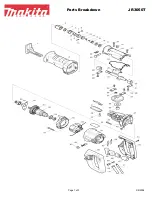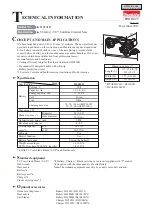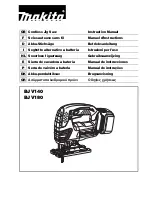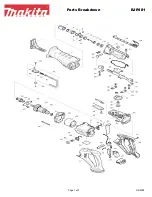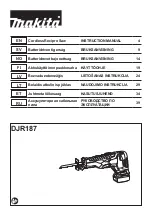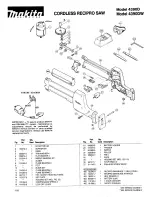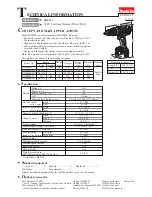
IMpORTANT WARRANTY INFORMATION:
The battery pack fitted to this cordless tool is considered to be a consumable item and its ability to accept charge will reduce over
time. We will warranty it against mechanical and electrical defect for a period of one year - this does not cover fair wear and tear. If the
battery is not properly charged before first use, or regularly conditioned, its capacity will diminish. Under these circumstances we will
not replace the battery pack even if it is less than one year old.
3.1.
CHARGING THE BATTERY pACk
3.1.1. To remove the battery pack from the drill, depress the two side clips on the battery. Do not touch the metal battery terminals.
3.1.2. Place the charger on a safe flat surface and connect to the mains.
3.1.3. The battery is designed to fit into the charger one way only. This is to ensure that the positive (+) and negative (-) polarities
correspond. Align the + and - polarity marks on the base of the battery with the + and - marks on the charger, insert the battery and
press lightly to seat the battery firmly into the charger (fig.1).
WARNING! DO NOT try to force battery into the charger with crossed
polarities.
3.1.4. When the battery is inserted the green LED will illuminate to indicate that
charging is taking place. The battery will take 3 to 5 hours to fully charge
(
note:
the green LED will stay illuminated and
NOT
extinguish when the
battery is fully charged).
Note: When new, the battery may have been shipped in a low charge state. It
will take longer to charge the battery initially and several subsequent
charges may also take a little longer, than when the battery reaches its
optimum performance.
3.1.5. Remove the battery from the charger. Unplug the charger from the mains.
Push the battery into the drill's base, until it latches into place. The drill is
now ready for use.
Note:
If you need to recharge the battery
immediately
after use allow the
battery to cool before inserting it into the charger.
3.2.
USING THE DRILL
(Ensure that you have read, understood and comply with all the
safety instructions in Section 1)
WARNING! Always wear approved safety glasses when drilling.
3.2.1.
Ensure the direction switch is in the mid (lock) position. open the chuck
by holding the rear collar and turning the front chuck collar (See fig.2).
3. OpERATING INSTRUCTIONS
2. INTRODUCTION & SpECIFICATION
1.4. BATTERY CHARGER SAFETY INSTRUCTIONS.
WARNING!
DO NOT
use the charger to charge any battery other than that supplied for the drill. Other types of batteries may explode!
All mains electrical supply safety features must be followed as described in 1.3. above.
Disconnect the charger from the mains power supply when not in use.
DO NOT
operate the charger if it has been dropped, or has received a sharp knock, or is damaged. Contact an authorised service agent.
DO NOT
insert foreign objects or material into the hole reserved for the battery.
DO NOT
force the battery into the charger. The battery will only fit one way to ensure correct polarity alignment.
DO NOT
immediately charge a second battery. Consecutive charging will overheat the charger. Allow the unit to cool for 15 minutes
before charging the next battery.
DO NOT
attempt to connect two chargers together.
Store the charger in the same manner as the battery, see section 1.2.
Variable Speed: . . . . . . . . . . . . . . . . . . . . . . . . . . . . . . . . 0-550rpm
Chuck Size: . . . . . . . . . . . . . . . . . . . . . . . . . . . . . . . . . . . . . .10mm
Weight Including Battery: . . . . . . . . . . . . . . . . . . . . . . . . . . . 1.48kg
Battery Model no:. . . . . . . . . . . . . . . . . . . . . . . . . . . .CP14035VBP
noise Power . . . . . . . . . . . . . . . . . . . . . . . . . . . . . . . . . . . . . 67dB.A
noise Pressure. . . . . . . . . . . . . . . . . . . . . . . . . . . . . . . . . . . 78dB.A
Drilling Capacities:
Wood: . . . . . . . . . . . . . . . . . . . . . . . . . . . . . . . . . . . . . . . . . . .10mm
Metal: . . . . . . . . . . . . . . . . . . . . . . . . . . . . . . . . . . . . . . . . . . . .6mm
Accessories: . . . . . . . . . . . . . . . . . . . . . . . . . . . Magnetic Bit Holder
Drills:. . . . . . . . . . . . . . . . . . . . . . . . . . . . . . . 1.5, 2.5, 3, 4, 5, 6mm
Screwdriver Bits: . . . Slotted 5, 6mm / Phillips #1, #2 / Pozi #1, #2
Superbly balanced tool, intended for professional use. Features twenty one position torque control. Electronic variable speed control with
reverse. 10mm keyless chuck. LCD display indicates battery level. Ideal for both screw driving and drilling. Supplied in carry-case together with
accessories.
fig.1
Original Language Version
CP14035V Issue:4 - 12/01/12
Risk of Hand Arm vibration Injury
Cordless Drill/Driver 14.4V model no. CP14035V when operated in accordance with these instructions and tested in accordance with BS En
28662-1:1993, ISo 8662-1:1988 and BS En ISo 8662-6:1995, ISo 8662-6:1994 results in the following vibration emission declared in
accordance with BS En 12096:1996.
Measured vibration emission value:
0.969m/s²
Uncertainty:
0.39m/s²
These values are suitable for comparison with emission levels of other tools that have been subject to the same test.
This tool may cause hand-arm vibration syndrome if its use is inadequately managed.
This is a ‘
NO LOAD’
vibration figure.
A competent person should carry out a risk assessment following HSE guidelines.
Measurement results can be highly variable, depending on many factors, including the operator's technique, the condition of the work
equipment, the material being processed and the measurement method.
Recommended Measures to reduce risk of hand-arm vibration syndrome:
We recommend appropriate safety equipment is utilised and regular breaks for the operator are employed to reduce any residual risk of
fatigue or repetitive strain injury.




